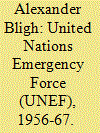| Srl | Item |
| 1 |
ID:
134388


|
|
|
|
|
| Summary/Abstract |
The role of force in United Nations peacekeeping has changed dramatically since the first observer mission in 1948. Once, peacekeepers used force only in the most exceptional circumstances and only in self-defense. By the mid-1970s, peacekeepers were authorized to defend the mandates of their operations, still as a variant of ‘self-defense’ but with greater scope for offensive force. Since the turn of the century, corresponding with the ‘Brahimi Report’, the language of self-defense is no longer in use in peacekeeping mandates. Instead, the Security Council routinely finds the existence of threats to international peace and security and vest ‘robust’ peacekeeping operations with the ability to use offensive force. The role of the controversial ‘responsibility to protect’ doctrine in peacekeeping is examined; however, it is concluded that, as yet, the doctrine has had limited impact on the legal framework relating to peacekeeping.
|
|
|
|
|
|
|
|
|
|
|
|
|
|
|
|
| 2 |
ID:
133531


|
|
|
|
|
| Publication |
2014.
|
| Summary/Abstract |
With the conclusion of almost every round of hostilities between Israel and one of its neighbours the idea of international forces is being raised once again. This is basically an improved and revised initiative for stationing international forces to supervise (and perhaps impose) a ceasefire between the parties. In the Arab-Israeli framework, it is in essence the old approach which has been in service since 1948. Only one force, UNEF, stands out as not having been approved by the Security Council and clearly failing its intended but vaguely defined mission. The current analysis leads to the conclusion that in this particular regional conflict, the positioning of international forces must always come within the context of a more comprehensive settlement. That way, by violating a force's mandate, each party would lose either land or diplomatic recognition. Moreover, if a Middle Eastern peacekeeping operation is to take place in the future, it has to include organic units of the warring parties, encouraging peaceful interactions. Such units should reinforce organic units from countries acceptable to all parties. Hopefully, future missions, taking into consideration some of the approaches suggested here, can continue to contribute to regional processes for peace.
|
|
|
|
|
|
|
|
|
|
|
|
|
|
|
|